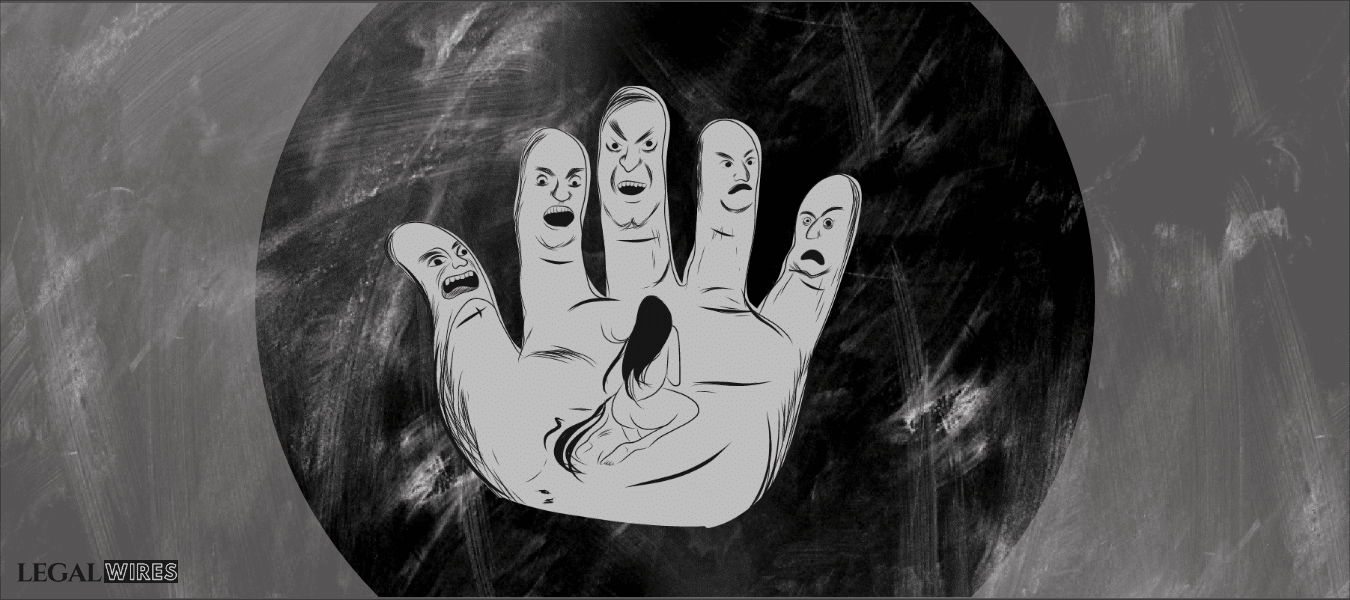Rape is an unwilling and forceful sexual intercourse with a woman. The term rape is stemmed from a Latin phrase rapio which means to Confiscate or Seize.

DEFINITION
Rape is covered under Sec.375 of Indian Penal Code, 1860 which defines it as sexual intercourse of a man with a woman under situations falling underneath any of the six subsequent descriptions[1]:-
- Against her will. i.e. against her desire.
- Without her consent i.e. permission is not given.
- With her consent but that consent is obtained by creating a fear of death or hurt to person she know such as family , spouse , children etc. or to defame her by means of online platform by spreading her nudes or any source of things.
- Consent given under misconception of the man being her husband.
- Consent obtained during unsoundness of mind or under the influence of intoxication or any stupefying or unwholesome substance by effect of which she become unable to under the situation and its repercussion.
- Sexual intercourse by man with a minor girl, (a girl is said to be minor under Indian law if she has not achieved the age of 18) by or deprived of her consent.
- When she is unable to convey the consent.
MEANING
Rape is an unwilling and forceful sexual intercourse with a woman. The term rape is stemmed from a Latin phrase rapio which means to Confiscate or Seize. The explanation of this section states that if the penetration is done during the sexual intercourse against her will, then it is sufficient to constitute the crime of rape.
- The term will under section 375 defines the rational capability of the mind to distinguish between what is right and what is wrong. Every act done against the will constitutes an act without consent, but it is not vice-versa which means it need not be necessary that every act without consent is against the will. Therefore the word Will plays an important role in the crime of RAPE. The Supreme court held in the case of State of Punjab v. Gurmit Singh [2] that the act was against the will and hence amounts to rape under Sec.375 of IPC, 1860.
- The consent must be free without any pressure, force, coercion, undue influence, deceit, or fallacy. The consent obtained after the rape is not the valid defence to the guilty. An act of sexual intercourse in the sleeping position also constitutes rape as she is incapable of giving the consent. In the charge of rape, the burden of proof lies upon the prosecution to bring out the proof that the intercourse did not included the consent or was forceful.
- There need not be actual use of force to harm the victim’s family, even threat in order to execute the intercourse is sufficient to constitute it as an offence.[3]
- Consent given by the woman to perform sex to a person which she got misconception of him being her husband is not a valid consent in law.
- Often it is found that the woman was drugged or given any perplexing/stupefying/ unwholesome substance and then performed sexual intercourse . Or there is another situation where sexual intercourse is performed with an unsound woman .The situation stated above nowhere constitutes the consent of the woman . Hence this provision safeguards the interest of women.[4]
- Sexual intercourse with minor is mostly rape because she is incapable of knowing the difference between right and wrong and further giving consent.[5]
USAGE (LEGAL)
Section 375 of Indian Penal code, 1860 , talks about the offence of rape ; Section 376(1) constitutes punishment for rape ; Section 376(2) defines aggravated form of Rape. Other than this there are some other important sections from Section 376A-376E.
Essentials of Rape :
- Penetration of penis into the vagina, anus, mouth, or urethra , to any extent or making compelling her to do the same with him or any other person.
- Penetration of any object or any part of the body ( penis) into the vagina, anus, mouth, or urethra, to any extent or making compelling her to do the same with him or any other person.
- By manipulating any part of woman body, in order to cause penetration in vagina, anus, mouth, or urethra or any part of body ,with him or any other person
- Applying of mouth into vagina, anus, mouth, or urethra of woman’s body or making her to do it with him or any other person without consent[6]
Punishment [Sec.376(1)]-
The person committing rape is subjected to rigorous imprisonment of not less than 10 years, but which may extend to imprisonment of life including the liability to pay fine .
Aggravated form of Rape [Sec.376(2)]-
Rape –
- by a police officer in the course of exercising her duty, in the police station/ in any station houses /on a woman in custody by an officer or his subordinates.
- by any public servant in his custody /of his subordinate’s custody
- by a member of armed forces
- by any staff of jail/ incarcerate home / any children’s or women organization recognized under law.
- By staff / management in hospital
- By relative /guardian / teacher/person of trust
- By any person during communal violence
- On pregnant woman
- On minor
- On person incapable of giving consent
- In case of dominance over woman , to commit rape
- On unsound woman
- Committing rape causing grievous hurt /death
- Rape repeatedly on the same woman
Other important sections-
- Sec.376(A)-causing death or causing in relentless somatic state of victim
- Sec.376(B)-sexual intercourse by husband upon wife during divorce.
- Sec.376(C)-sexual intercourse by one in power
- Sec.376(D)-gang rape
- Sec.376(E)-repeat offenders
ORIGIN-
The term rape has been originated from the Latin rapere, to steal, to grab, to hold off. Since the 14th century, the term means to confiscate and take away by force. In Roman law, the holding off of a woman by force, with or devoid of intercourse, established “raptus”. In Medieval English law the identical term could refer to either abduction or rape in the contemporary sense of “sexual violation”. The original meaning of bring off by force is still found in some phrases, such as “rape and pillage”, or in titles, such as the stories of the Rape of the Sabine Women and therefore the Rape of Europa or the poem The Rape of the Lock, which is about the theft of a lock of hair.
[1] The Indian Penal Code (45 of 1860), bare act with short comments , page no.139
[2] 1996 AIR 1393, 1996 SCC (2) 384
[3] Tukaram & anr. v. State of Maharashtra ( Mathura Case) 1979 AIR 185, 1979 SCR (1) 810
[4] Kunhimon Alias Sainudeen And Etc. … vs The State , 1988 CriLJ 493
[5] DPP v Morgan [1976] AC 182
[6] The Indian Penal Code (45 of 1860), bare act with short comments , page no.139




